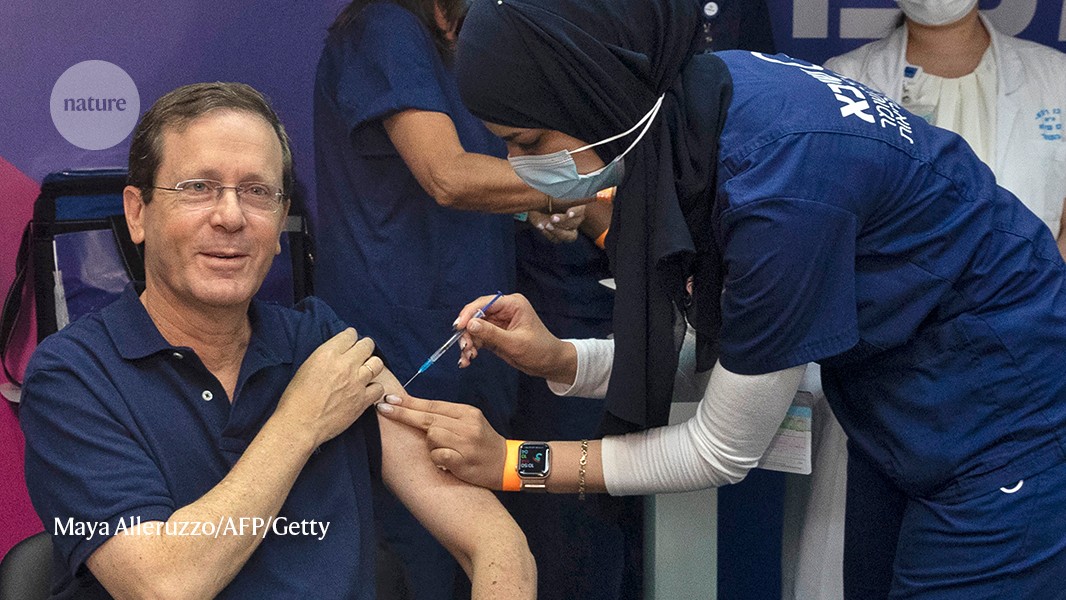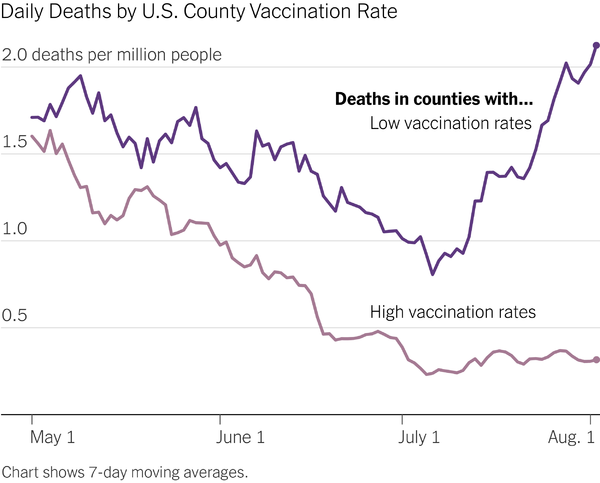- Joined
- Jun 8, 2008
- Messages
- 56,745

Fauci Backs Vaccines; Chicago Praises Lollapalooza: Virus Update
Anthony Fauci, the U.S.’s top infectious disease doctor, said Covid-19 vaccines work extremely well and that a return to the lockdowns of 2020 is unlikely. Israel’s public health officials are begining to see signs of more serious disease among the vaccinated elderly.
Florida has become the new epicenter of the U.S. pandemic as it recorded its highest one-day increase of Covid-19 cases since the start of the outbreak. Cases in Australia’s hotspot of Sydney matched an all-time high while parts of Queensland state entered a second day of lockdown.
The Biden administration has monitored the delta variant for weeks but appeared surprised by the extent of its spread, according to a senior White House official. Progressive members of the Congress renewed their calls to extend a national eviction moratorium that is set to expire Saturday at midnight.
Thousands in France protested again over a coronavirus pass, with some clashing with police. The U.K. is preparing to ease travel bans for visitors passing through airports in Dubai, Abu Dhabi and more.
"

Malaysia Upbeat on Vaccine Target (4:18 p.m. HK)
Malaysia’s government is optimistic of achieving its target of fully vaccinating 50% of the nation’s adult population by Aug. 31, Bernama reported on Sunday, citing Science Minister Khairy Jamaluddin.About 29% of the adult population had completed both doses of the vaccine so far, and 59% have received one dose, the state news agency cited him as saying.
Meantime, the number of daily Covid vaccinations has surpassed a record 500,000 for six straight days, Bernama reported, citing Health Minister Adham Baba.
Uber’s U.K. Vaccine Incentives (4:06 p.m. HK)
Several food and travel companies in the U.K. will start giving incentives and offering discounts to urge Britons to get vaccinated, according to the Department of Health and Social Care.Uber Technologies Inc. will send users a vaccine reminder and give lower rates for young adults who get the shot. Bolt, another ride-share company, is offering free ride credits to vaccine centers, and Deliveroo Plc and Pizza Pilgrims are also aiding the drive.
Over 600,000 people were vaccinated at walk-in clinics last weekend and more sites have been made available this week, the department said.
Support for N.Z.’s Ardern Slips Amid Virus (3:57 p.m. HK)
Support for New Zealand Prime Minister Jacinda Ardern’s Labour Party has slipped by almost 10 percentage points amid increasing scrutiny of the government’s response to the coronavirus, according to a poll by Newshub-Reid Research.Labour’s support fell to 43% compared with a May survey, while New Zealand National Party’s backing rose to almost 29% and ACT Party’s increased to about 11%, Newshub-Reid found. Ardern was still preferred Prime Minister by a large margin.
The research was conducted July 22 to 29 and had a margin of error of 3.3%, according to Newshub-Reid.
Ho Chi Minh City Curbs (2:24 p.m. HK)
Vietnam authorities extended the stay-at-home order covering most of the nation’s southern region, including the commercial hub of Ho Chi Minh City, for two weeks.The extension is directed at 19 localities and is part of the government’s aggressive anti-virus measures to contain the nation’s worst coronavirus outbreak, which began in late April.
The country reported a total 150,060 virus cases and 1,306 deaths as of Saturday, with 97% of infections recorded from late April, according to the health ministry. Ho Chi Minh City accounts for about 63% of infections in the current outbreak.
Philippines Budget Secretary Catches Covid (11:15 a.m. HK)
Philippines Budget Secretary Wendel Avisado will be on two-week’s medical leave from Aug. 2 after being hospitalized with Covid-19, according to a statement Saturday night. Undersecretary Tina Rose Marie Canda will be the officer-in-charge during the period.Meanwhile, Health Undersecretary Maria Rosario Vergeire told a forum that initial estimates from experts suggest the nation’s daily cases could climb to 18,000-30,000 by September, even with a two-week lockdown this month. The Philippines reported more than 8,000 cases each on July 30 and July 31, which were the most in two months.
Sydney Reports Record Number of Cases (9:20 a.m. HK)
Sydney reported a record-matching 239 new local cases of Covid-19 over the 24 hours to 8 p.m. Saturday as the delta-strain outbreak continues to spread in Australia’s biggest city.
New South Wales state Premier Gladys Berejiklian said there were some signs that the virus is mostly being contained to parts of the city with the strictest curbs. The entire Sydney region is in lockdown until Aug. 28.
There were nine new locally acquired cases in Queensland, which on Saturday imposed a snap lockdown on its most populous region of the southeast, the state’s chief health officer, Jeannette Young, said at a briefing. Victoria state reported four new local cases while in New Zealand there were no new cases in the community, according to health authorities.
Infections in Vaccinated Hospital Workers (7:45 a.m. HK)
Two major San Francisco hospitals are reporting hundreds of cases and high rates of Covid-19 among vaccinated workers, but only two hospitalizations.The University of California, San Francisco Medical Center said it had 183 employees, many in clinical areas, test positive over the last month, and 153 had been vaccinated. Only two of the vaccinated cases required hospitalization, the hospital said in a statement.
Zuckerberg San Francisco General Hospital reported that about 50 staff members were infected in July -- as many as 80% of them vaccinated, the New York Times reported, quoting the hospital’s chief medical officer. No one was hospitalized, the newspaper reported.
Florida Breaks Daily Case Record (5:00 p.m. NY)
Florida reported 21,683 new cases on Friday, breaking a daily record for the entire pandemic, according to data from the U.S. Centers for Disease Control and Prevention.The state’s previous one-day record, according to the CDC data, was more than 19,100 in early January. The third most populous state, Florida now accounts for about one in five new virus infections in the entire U.S.
English Deaths Undercounted: Telegraph (4:45 p.m. NY)
The death toll from Covid in care homes in England was probably about 4,000 higher than reported, the Sunday Telegraph said citing unidentified care providers.The official count of 39,017 covered elderly people who died between April 10, 2020, and March 31 this year.
Care providers say thousands more probably died before April 10 because the industry watchdog had earlier signed off on a government policy that allowed Covid-positive patients to be discharged from hospitals into care homes, the newspaper reported. Testing wasn’t required for asymptomatic patients.
U.K. Set to Exempt Pass-Through Visitors (4:35 p.m. NY)
U.K. officials are close to an agreement to allow travelers to pass through airports in Dubai, Abu Dhabi, Istanbul, Doha and Bahrain, without having to quarantine in a hotel when they arrive, the Telegraph reported Saturday.The move will make it cheaper and easier for business travelers and families to reunite with relatives in Australia, New Zealand and the Middle East who often have to pass through these transit hubs.
Anti-Vax App Tests Rules (3 p.m. NY)
A new social media app called “Unjected,” designed for the unvaccinated, is testing Google and Apple Inc.’s policies concerning the spread of misinformation about Covid-19 vaccines.Apple removed the app from its App Store after being contacted by Bloomberg News. Unjected, when told by Google Play that its social feed contains misinformation, removed the section to get back in compliance with the app store.
California Positive Rate Near Six-Month High (2:45 p.m. NY)
California’s test positivity rate rose to 6.4%, the most since early February.Hospitalizations climbed to the highest since early March. Still, availability of intensive-care unit beds remains at almost twice the level of mid-January, when several counties in the state were running out of ICU beds as cases peaked.
White House Caught Off Guard by Delta (2:00 p.m. NY)
White House officials have monitored the delta variant for weeks but were surprised by the extent of its spread, according to a senior White House official.The surge prompted an urgent warning on the renter eviction ban, the reimposition of a masking recommendation and President Joe Biden’s repeated pleas for Americans to get vaccinated.
N.Y. New Infections Top 3,000 (12:35 p.m. NY)
New York state’s new infections rose above 3,000, Governor Andrew Cuomo announced, the first time since early May that it’s hit that level. New infections have more than quadrupled in the last month but remain far below the daily peak of almost 20,000 in mid-January.The positive test rate reached 2.6%, up from a low of 0.3% in mid-June but below the current national average of 7.8%. Deaths remain low, with five reported on Saturday.
U.S. Cases Jump, Driven By Florida (11:38 a.m. NY)
The overall U.S. weekly case tally was more than five times that of a month ago and the highest since mid-February, data released on Friday showed.
Florida made up about 1 in 5 of the U.S.’s total weekly cases of 544,569, according to data compiled by Johns Hopkins University and Bloomberg. Florida, which releases its virus data weekly, reported 110,477 cases on Friday.
Hospital admissions, while well below the peak of the last surge in January, increased more than 46% in a week. Fatalities rose more than 33%, according to data from the U.S. Centers for Disease Control and Prevention.
Vietnam Stay-Home Extension (10:08 a.m. NY)
Vietnam authorities extended the stay-at-home order covering most of the nation’s southern region including the commercial hub of Ho Chi Minh City for two weeks.The existing order for Ho Chi Minh City ends Aug. 1. The extension is directed at 19 localities and is part of the government’s aggressive anti-virus measures to contain the nation’s worst coronavirus outbreak that began in late April.
Cases Climb in Central Chinese City (10:01 a.m. NY)
The number of Covid-19 cases keeps rising in the city of Zhengzhou in central China, which recently suffered a deadly flood.The city found 11 confirmed cases and 16 asymptomatic infections by Friday evening, local health officials said at a press briefing Saturday night, according a report by the state broadcaster CCTV.
Colleges Bring Back Masks (9:46 a.m. NY)
Yale and Cornell are reinstating requirements that all individuals wear masks in most indoor campus spaces, joining other colleges in efforts to combat the fast-spreading delta variant.Third Weekend of Protests in France (8:32 a.m. NY)
Thousands of people protested against France’s special virus pass with marches through Paris and other cities on Saturday as well as sporadic clashes with riot police, the AP reported.French lawmakers passed a bill requiring the pass in most places as of Aug. 9. In the past 24 hours, France reported 23,471 new coronavirus cases and 43 deaths.
China Vaccine Study (6:08 a.m. NY)
China is studying if it’s necessary to give booster vaccines to vulnerable groups such as the elderly, people with underlying diseases and those who work in high-risk areas.There isn’t enough evidence yet to suggest that a third shot is needed for everyone, Wang Huaqing, chief immunologist at the Chinese Center for Disease Control and Prevention, said at a press briefing Saturday.
— With assistance by Brett Miller, Clarissa Batino, Xuan Quynh Nguyen, Mai Ngoc Chau, Ian Fisher, Megan Durisin, and Ravil Shirodkar



















300x240.png)